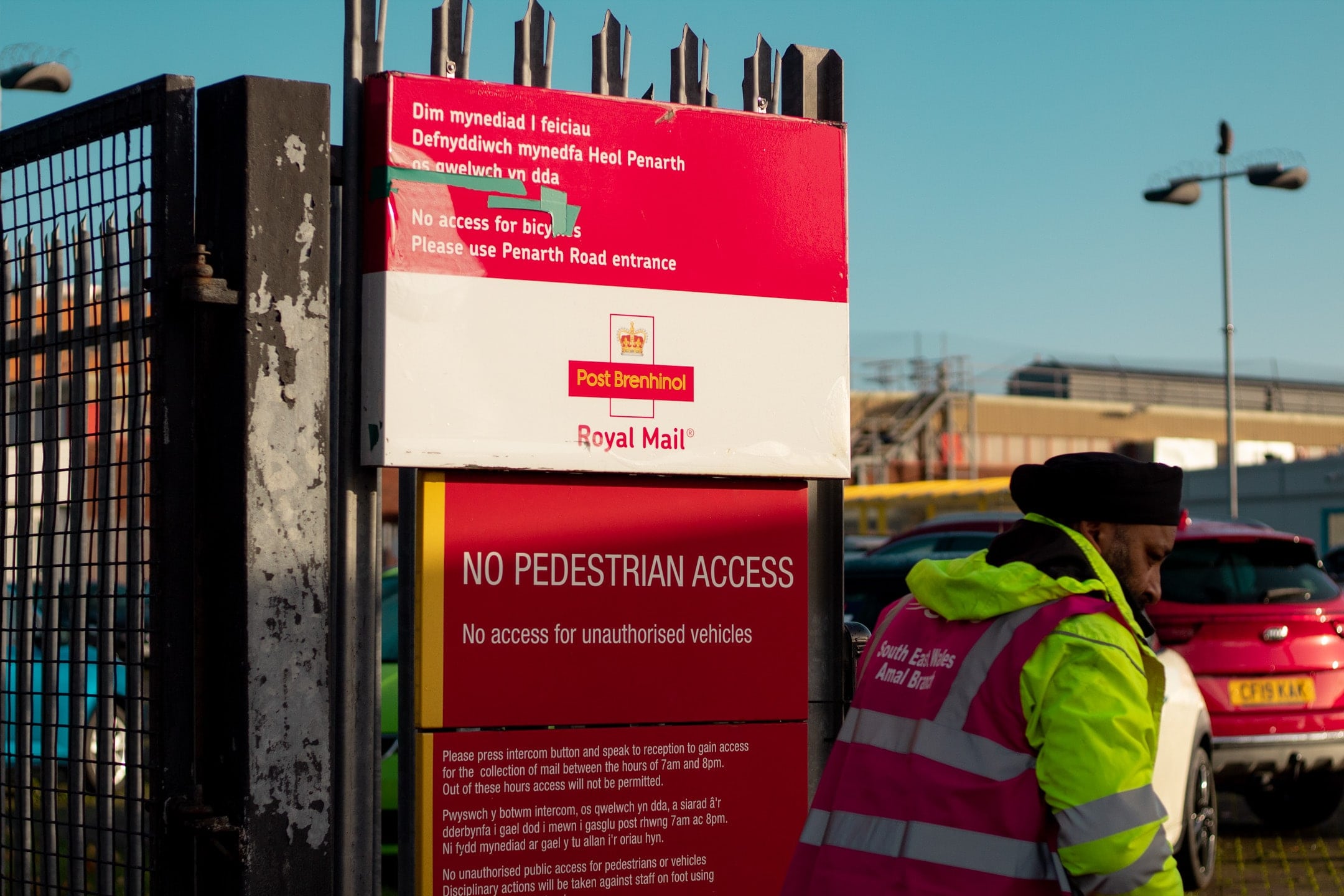
“There Comes A Point Where Your Decisions Are Not Your Own” – The True Cost Of Uberisation At Royal Mail
What does it feel like when your whole way of life, from family time to weekends, is at risk of being shredded to pieces in the name of profit? Ka Long Tung met a striking Royal Mail worker to find out.
By Ka Long Tung
I first met Sai in late October on an early morning picket line in Cardiff. This time, when we meet again a month and a half later, there’s no picket line in front of his Royal Mail workplace. Instead, we meet at the entrance and he takes me to the union office inside.
But the absence of a picket line doesn’t mean that workers have finished their fight. In fact, a few days before we meet, on 1 December, over 100,000 posties across the country have again walked out and will do the same for six more days in December.
The strikes – among the biggest and most consequential of the year – are not just against below-inflation pay, but the very nature of being a postal worker.
For Sai and his fellow strikers, their whole quality of life is on the line.
Their union, the Communication Workers Union (CWU), has accused CEO Simon Thompson and the board of attempting to turn Royal Mail into a gig economy style parcel courier, or as they call it: The “uberisation” of the 500-year-old company.
This was brought home when in late November, the CWU rejected a proposal by Royal Mail which included the removal of Sunday premium payment, later starting and finishing time, more worker flexibility, seasonal variations and a cut to their sick pay.
Sai is not his real name.
He said members from other mail centres had been warmed by managers regarding participation in industrial action, and he didn’t want to be named as out of fear his boss would reduce Sai’s time to engage in union duties.
He told me about how the proposed changes make posties feel like a gig economy worker.
“In order to deliver parcels later on into the evening, they’re all about abandoning the AM [early morning] period …,” Sai says. “What Amazon does, they want to compete into stuff like that.”
He explains that being a postie has traditionally been a stable job for many because of the fixed working schedule. However, the potential changes mean that all this is going to change. If posties are forced to start work later and have a ‘flexible’ rota, their whole life routine will be shattered.
The cancellation of the Sunday premium payment also means that Sunday will become just another normal working day. However, it can be an important time for some to strike a balance between their work and private lives.
“The main thing is that you want to build a rapport with your children and your family, and keep that family unit,” Sai tells me, in recognition that this is now all under threat.
“If you look back at trade unions, people had to really struggle to fight to get the weekend off. It just seems to be a race to the bottom for Royal Mail.”
Uberisation, indeed, is not a new thing for Royal Mail.
In 2019, workers in eCourier, a Royal Mail subsidiary, went on strike for employment rights as they were classified as independent contractors.
Angard Staffing, a recruitment partner for Royal Mail and part of the Royal Mail Group, has 15,000 flexible workers according to its website. It’s been in business for 10 years.
Sai says that “uberisation” has already happened in his workplace. He describes the practice as a two-tier system as new workers work 40 hours a week, which is 3 hours more than others, and get 20% less.
Those more junior workers are under worse-off terms and conditions and have different working periods compared to their senior counterparts.
“Why should we have a two-tier workforce,” he asks, “where, for instance, I could be working on and finish at a certain time, and you’ll still be working after me, but you’ll be getting the same in money?”
“It’s not something that we’re willing to accept, but they’ve already started doing it.”
In mid-October, Royal Mail accounted for plans to cut 10,000 jobs by next August. Sai is scared that it would further push the casualisation of the workforce.
Royal Mail will use their workforce from Angard Staffing to fulfil the tasks that are left by the 10,000 redundancies, Sai predicts.
“When you’re talking about uberisation, that’s that. They got their own in-house Royal Mail agency workers, they got agency employees under Royal Mail Group, that’s where they want to go.”
“You could really say it’s more or less fire and rehire,” he points out.
Sai reckons that those agency workers will be under zero-hour contact with an unpredictable working rota. They might also be owner drivers instead of driving the iconic Royal Mail red van.
The use of these workers is unacceptable to Sai. He said he “can’t see the reason why you can’t give somebody a full-time job.”
“With all pensions and our terms and conditions to go with as well.”
He is determined not to back down, however, and is in favour of escalating strike action. Sai does not want to see degrading conditions become a common practice in Royal Mail.
“I think that terms and conditions, that’s probably one of the best parts of being a postman,” he tells me. “Our terms and conditions were being fought for in previous strikes, and this is what stands out to people to become a postman.”
“These are sacrifices that we won’t [let] go because we made sacrifices for them in the past – some of the big industrial actions that we’ve taken in the past.”
Not having a fixed work time and control of working over the weekend would be something unimaginable for posties who started their careers decades ago like Sai himself.
“There comes a point where your decisions are not your own.”
The identity of being a postman will also be altered. Shifts may be allocated in a different way from before.
“Obviously, the casualisation of work is that you won’t have a familiar face on your round, which you can rely on. A postman is really a part of the community.”
“Because a lot of them have been doing it for years, the same streets, they know the individuals. They can sense when something is wrong,” he explains.
He points out how the rapport between posties and their neighbourhood was seen during the pandemic when people could have someone to talk to while not being out for a long time.
”There have been stories…” he says “You got to knock on the door, or you got to put a letter in the door. The door opened, and they found an old lady on the floor who was falling off because she’d been at all night. So they sat down and waited for the ambulance. They phoned the ambulance and sat there and waited and comforted her while waiting for the ambulance.”
“That’s priceless.”
But the changes being brought in look custom made to stop workers being able to look after people in this way.
As the Royal Mail proposal suggests, technology will be used to monitor workers’ productivity, which is a common practice in the gig economy.
“They got those technologies where they will challenge that postman ‘why were you standing there talking for two minutes? Why were you stood there? Why did you stop for two minutes at that address?’ And that’s funny, they’re having to justify themselves for doing it.”
The strike continues.



2 Comments
Comments are closed.